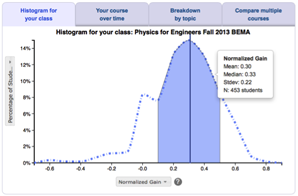Developed by David Rosengrant and Chandralekha Singh
| Purpose | To understand the difficulties students have in interpreting the concepts of energy and momentum and in correctly identifying and applying them in different physical situations. |
|---|---|
| Format | Pre/post, Multiple-choice |
| Duration | 50 min |
| Focus | Mechanics Content knowledge (energy, momentum) |
| Level | Intro college |
Sample questions from the EMCS:

EMCS Implementation and Troubleshooting Guide
Everything you need to know about implementing the EMCS in your class.
Login or register to download the implementation guide.
more details
This is the highest level of research validation, corresponding to all seven of the validation categories below.
Research Validation Summary
Based on Research Into:
- Student thinking
Studied Using:
- Student interviews
- Expert review
- Appropriate statistical analysis
Research Conducted:
- At multiple institutions
- By multiple research groups
- Peer-reviewed publication
The multiple-choice questions on the EMCS were developed by first planning the content and complexity to be tested and getting feedback from experts. Questions were then written and student responses to open-ended versions of the questions were collected. These student responses and findings from student interviews were used to create the multiple-choice options, which then underwent further expert review. Appropriate statistical analyses of reliability and discrimination found the EMCS to have good reliability and discrimination. A factor analysis found six factors, but the factors accounted for a very small amount of the variance, so they are not meaningful. The EMCS has been given to over 3000 students at a variety of institutions to students in algebra-based and calculus-based courses. There are three peer-reviewed publications presenting EMCS data.
References
- M. Brundage, Investigating and Improving Student Understanding of Mechanics, Electricity and Magnetism, Quantum Mechanics, and Thermodynamics using Conceptual Surveys, Ph.D. Dissertation, University of Pittsburgh, 2024.
- M. Sahin, The impact of problem-based learning on engineering students’ beliefs about physics and conceptual understanding of energy and momentum, Eur. J. Engr. Educ. 35 (5), 519 (2010).
- C. Singh and D. Rosengrant, Students' Conceptual Knowledge of Energy and Momentum, presented at the Physics Education Research Conference 2001, Rochester, New York, 2001.
- C. Singh and D. Rosengrant, Multiple-choice test of energy and momentum concepts, Am. J. Phys. 71 (6), 607 (2003).
PhysPort provides translations of assessments as a service to our users, but does not endorse the accuracy or validity of translations. Assessments validated for one language and culture may not be valid for other languages and cultures.
| Language | Translator(s) | |
|---|---|---|
| Finnish | Antti Savinainen and Kauko Kauhanen |  |
| Indonesian | Syuhendri Syuhendri |  |
| Swedish | Adi Bijedic |  |
If you know of a translation that we don't have yet, or if you would like to translate this assessment, please contact us!
Score the EMCS on the PhysPort Data Explorer
With one click, you get a comprehensive analysis of your results. You can:
- Examine your most recent results
- Chart your progress over time
- Breakdown any assessment by question or cluster
- Compare between courses
| Typical Results | ||||||||||||||||||||
|---|---|---|---|---|---|---|---|---|---|---|---|---|---|---|---|---|---|---|---|---|
|
The latest version of the EMCS, released in 2001, is version 1.





